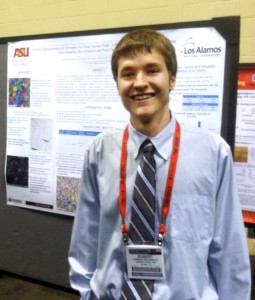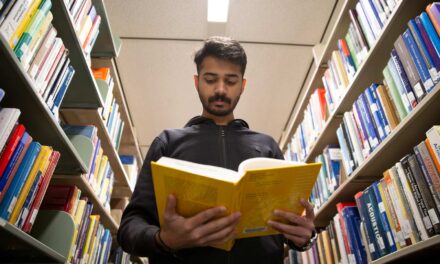
Student awarded for work to help develop sustainable nuclear energy technologies
 Posted: July 31, 2012
Posted: July 31, 2012Arizona State University engineering graduate student Robert McDonald has invitations to present his research at the upcoming American Nuclear Society winter meeting, participate in the U.S. Department of Energy (DOE) Fuel Cycle Technologies Annual Meeting and in a DOE-related Innovators’ Forum.
The opportunities are a result of McDonald recently winning an award in the DOE’s Innovation in Fuel Cycle Research Awards competition.
The award is based on research he presented last spring at an annual meeting of the Minerals, Metals and Materials Society from his report titled “Porosity Characterization of Surrogates for Oxide Nuclear Fuels: A Statistical Analysis of Correlations among Grain Boundary Misorientation, Pore Character and Location.”
McDonald conducted the research described in his report under the direction of Pedro Peralta, a professor of aerospace and mechanical engineering in the School for Engineering of Matter, Transport and Energy, one of ASU’s Ira A. Fulton Schools of Engineering. He will continue the work as part of Peralta’s research group as he pursues a master’s degree in materials science and engineering.
McDonald is examining trends in porosity found in sintered nuclear fuel pellets. Sintered materials are materials formed into a mass by heat and pressure.
Learning more about porosity is important for improving knowledge of the life cycle of nuclear fuel pellets. Understanding the initial conditions of pores in the pellets enables engineers to do more precise simulations and modeling of the pellets’ behavior when they are inserted in a nuclear reactor and while they are being processed.
The research is part of a larger project to determine the relationships between fuel-pellet processing conditions and the pellets’ microstructure and material properties. It’s a key step toward better understanding the optimal microstructure for oxide nuclear fuels. That knowledge is necessary to reduce the amount of radiotoxic materials that can be released during accidents, and to improve the durability and reliability of these fuels.
The DOE’s Innovations in Fuel Cycle Research Awards is part of the agency’s efforts to help advance development of sustainable nuclear energy technologies by encouraging students to pursue fuel-cycle research.
In addition to the research presentation opportunities, McDonald received $1,500 as part of the award.
Read more about the Innovations in Fuel Cycle Research Award program.
Written by Joe Kullman and Natalie Pierce



































